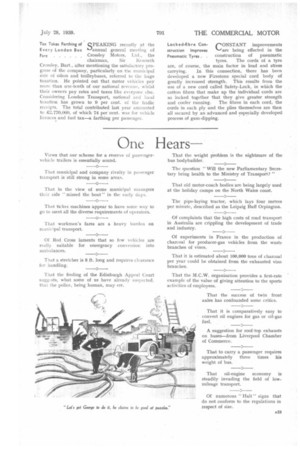One Hears—
Page 27

If you've noticed an error in this article please click here to report it so we can fix it.
Views that our scheme for a reserve of passengervehicle trailers is essentially sound.
That municipal and company rivalry in passenger transport is still strong in some areas.
That in the view of some municipal managers their side " missed the boat" in the early days.
That ticker machines appear to have some way to go to meet all the diverse requirements of operators.
That workmen's fares are a heavy burden on municipal transport.
Oi Red Cross laments that so few vehicles are really suitable for emergency conversion into ambulances.
That a stretcher is 8 ft. long and requires clearance for handling.
That the finding of the Edinburgh Appeal Court suggests, what some of us have already suspected, that the police, being human, may err. That the weight problem is the nightmare of the bus bodybuilder.
The question "Will the new Parliamentary Secretary bring health to the Ministry of Transport?"
That old motor-coach bodies are being largely used at the holiday camps on the North Wales coast.
The pipe-laying tractor, which lays four metres per minute, described as the Leipzig Buff Orpington.
Of complaints that the high costs of road transport in Australia are crippling the development of trade and industry.
Of experiments in France in the production of charcoal for producer-gas vehicles from the waste branches of vines.
That it is estimated about 100,000 tons of charcoal per year could be obtained from the exhausted vine branches.
That the M.C.W. organization provides a first-rate example of the value of giving attention to the sports activities of employees.
That the success of twin front axles has confounded some critics.
That it it is comparatively easy to convert oil engines for gas or oil-gas fuel.
A suggestion for roof-top exhausts on buses—from Liverpool Chamber of Commerce.
That to carry a passenger requires approximately three times his weight of bus.
That oil-engine economy is steadily invading the field of lowmileage transport.
Of numerous " Halt " signs that do not conform to the regulations in respect of size.












































































